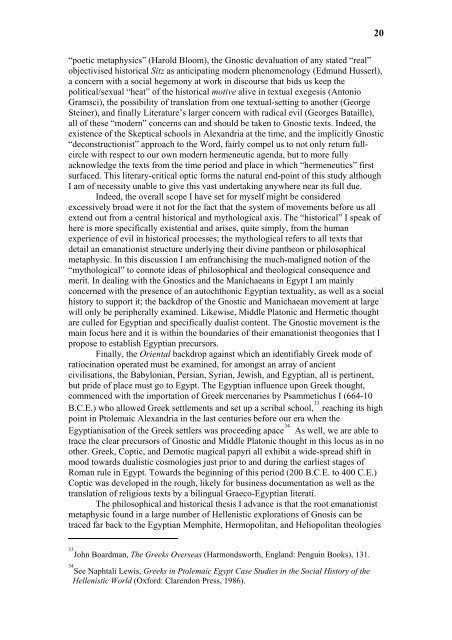THE EGYPTIAN FOUNDATIONS OF GNOSTIC THOUGHT
THE EGYPTIAN FOUNDATIONS OF GNOSTIC THOUGHT
THE EGYPTIAN FOUNDATIONS OF GNOSTIC THOUGHT
Create successful ePaper yourself
Turn your PDF publications into a flip-book with our unique Google optimized e-Paper software.
“poetic metaphysics” (Harold Bloom), the Gnostic devaluation of any stated “real”<br />
objectivised historical Sitz as anticipating modern phenomenology (Edmund Husserl),<br />
a concern with a social hegemony at work in discourse that bids us keep the<br />
political/sexual “heat” of the historical motive alive in textual exegesis (Antonio<br />
Gramsci), the possibility of translation from one textual-setting to another (George<br />
Steiner), and finally Literature’s larger concern with radical evil (Georges Bataille),<br />
all of these “modern” concerns can and should be taken to Gnostic texts. Indeed, the<br />
existence of the Skeptical schools in Alexandria at the time, and the implicitly Gnostic<br />
“deconstructionist” approach to the Word, fairly compel us to not only return fullcircle<br />
with respect to our own modern hermeneutic agenda, but to more fully<br />
acknowledge the texts from the time period and place in which “hermeneutics” first<br />
surfaced. This literary-critical optic forms the natural end-point of this study although<br />
I am of necessity unable to give this vast undertaking anywhere near its full due.<br />
Indeed, the overall scope I have set for myself might be considered<br />
excessively broad were it not for the fact that the system of movements before us all<br />
extend out from a central historical and mythological axis. The “historical” I speak of<br />
here is more specifically existential and arises, quite simply, from the human<br />
experience of evil in historical processes; the mythological refers to all texts that<br />
detail an emanationist structure underlying their divine pantheon or philosophical<br />
metaphysic. In this discussion I am enfranchising the much-maligned notion of the<br />
“mythological” to connote ideas of philosophical and theological consequence and<br />
merit. In dealing with the Gnostics and the Manichaeans in Egypt I am mainly<br />
concerned with the presence of an autochthonic Egyptian textuality, as well as a social<br />
history to support it; the backdrop of the Gnostic and Manichaean movement at large<br />
will only be peripherally examined. Likewise, Middle Platonic and Hermetic thought<br />
are culled for Egyptian and specifically dualist content. The Gnostic movement is the<br />
main focus here and it is within the boundaries of their emanationist theogonies that I<br />
propose to establish Egyptian precursors.<br />
Finally, the Oriental backdrop against which an identifiably Greek mode of<br />
ratiocination operated must be examined, for amongst an array of ancient<br />
civilisations, the Babylonian, Persian, Syrian, Jewish, and Egyptian, all is pertinent,<br />
but pride of place must go to Egypt. The Egyptian influence upon Greek thought,<br />
commenced with the importation of Greek mercenaries by Psammetichus I (664-10<br />
B.C.E.) who allowed Greek settlements and set up a scribal school, 33<br />
reaching its high<br />
point in Ptolemaic Alexandria in the last centuries before our era when the<br />
Egyptianisation of the Greek settlers was proceeding apace 34<br />
As well, we are able to<br />
trace the clear precursors of Gnostic and Middle Platonic thought in this locus as in no<br />
other. Greek, Coptic, and Demotic magical papyri all exhibit a wide-spread shift in<br />
mood towards dualistic cosmologies just prior to and during the earliest stages of<br />
Roman rule in Egypt. Towards the beginning of this period (200 B.C.E. to 400 C.E.)<br />
Coptic was developed in the rough, likely for business documentation as well as the<br />
translation of religious texts by a bilingual Graeco-Egyptian literati.<br />
The philosophical and historical thesis I advance is that the root emanationist<br />
metaphysic found in a large number of Hellenistic explorations of Gnosis can be<br />
traced far back to the Egyptian Memphite, Hermopolitan, and Heliopolitan theologies<br />
33<br />
John Boardman, The Greeks Overseas (Harmondsworth, England: Penguin Books), 131.<br />
34<br />
See Naphtali Lewis, Greeks in Ptolemaic Egypt Case Studies in the Social History of the<br />
Hellenistic World (Oxford: Clarendon Press, 1986).<br />
20










